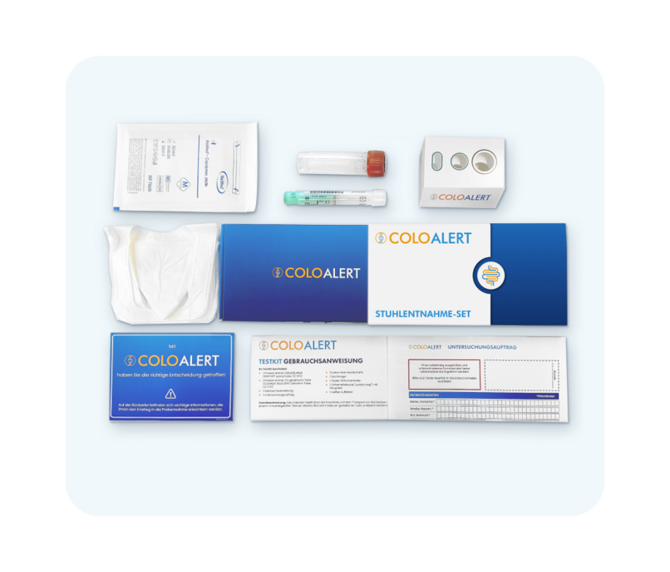Referenzen
1) Senore, C., Zorzi, M. (2020). Do We Need a New Paradigm for Assessing the Accuracy of Fecal Immunochemical Test Screening? Clinical Gastroenterology and Hepatology: The Official Clinical Practice Journal of the American Gastroenterological Association, 18(13), 2873-2875. doi.org/10.1016/j.cgh.2020.04.008 2) Dollinger, M. M., Behl, S., & Fleig, W. E. (2018). Early Detection of Colorectal Cancer: a Multi-Center Pre-Clinical Case Cohort Study for Validation of a Combined DNA Stool Test. Clinical Laboratory, 64(10), 1719–1730. doi.org/10.7754/Clin.Lab.2018.180521 3)Gies, A., Cuk, K., Schrotz-King, P., & Brenner, H. (2018). Direct Comparison of Diagnostic Performance of 9 Quantitative Fecal Immunochemical Tests for Colorectal Cancer Screening. Gastroenterology, 154(1), 93–104. doi.org/10.1053/j.gastro.2017.09.018 4) Robert Koch-Institut und die Gesellschaft der epidemiologischen Krebsregister in Deutschland e.V. (2023). Krebs in Deutschland für 2019/2020, 14. Ausgabe. 5) Amani, A., Weber, M. M., & Marko, C. (2019). Early Detection of a Colorectal Carcinoma in an Asymptomatic Patient Using a Combined DNA Stool Test. Clinical Laboratory, 65(9), 1751-1754. doi.org/10.7754/Clin.Lab.2019.190213 6) Leitlinienprogramm Onkologie (Deutsche Krebsgesellschaft, Deutsche Krebshilfe, AWMF) (2019). S3-Leitlinie Kolorektales Karzinom, Langversion 2.1, AWMF-Registrierungsnummer: 021/007OL 7) Johnson, C. M., Wei, C., Ensor, J. E., Smolenski, D. J., Amos, C. I., Levin, B., & Berry, D. A. (2013). Meta-analyses of Colorectal Cancer Risk Factors. Cancer Causes & Control: CCC, 24(6), 1207-1222. https://doi:10.1007/s10552-013-0201-5. 8) Ali Khan, U., Fallah, M., Sundquist, K., Sundquist, J., Brenner, H., Kharazmi, E. (2020). Risk of colorectal cancer in patients with diabetes mellitus: A Swedish nationwide cohort study. PLoS Medicine, 17(11), e1003431. doi.org/10.1371/journal.pmed.1003431




